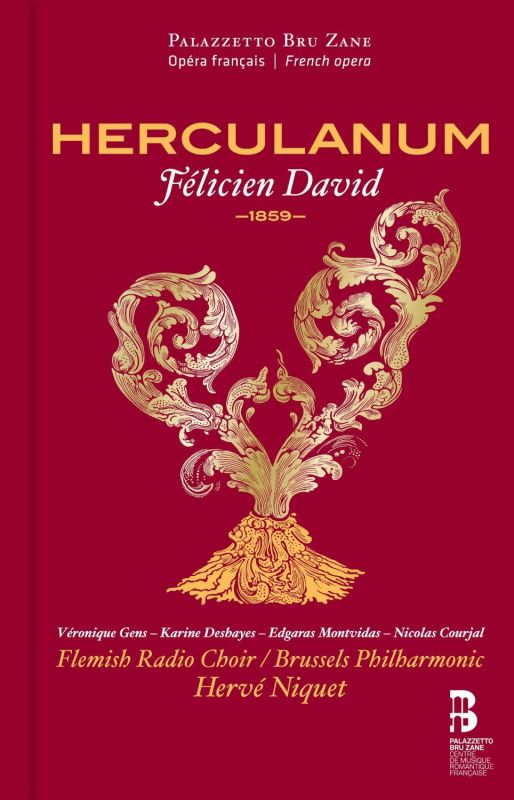DAVID Herculanum
View record and artist detailsRecord and Artist Details
Composer or Director: Félicien(-César) David
Genre:
Opera
Label: Ediciones Singulares
Magazine Review Date: 10/2015
Media Format: CD or Download
Media Runtime: 122
Mastering:
DDD
Catalogue Number: ES1020

Tracks:
| Composition | Artist Credit |
|---|---|
| Herculanum |
Félicien(-César) David, Composer
Brussels Philharmonic Orchestra Edgaras Montvidas, Hélios, Tenor Félicien(-César) David, Composer Flemish Radio Choir Hervé Niquet, Conductor Julien Véronèse, Magnus, Baritone Karine Deshayes, Olympia, Mezzo soprano Nicolas Courjal, Nicanor; Satan, Bass Véronique Gens, Lilia, Soprano |
Author: Hugo Shirley
The story pits a young early Christian couple, Hélios and Lilia, against the evil pagan Olympia. The action largely takes place in her pleasure gardens and palace in Herculaneum, with an excursion to the wilds of the Middle East in Act 2, where Satan, no less, makes an appearance, helping thereafter to steer the drama towards its cataclysmic conclusion. Christians are martyred; pagans and their godless city are consumed by Vesuvius.
On the way Olympia employs a love potion to seduce the young Hélios. Lilia learns of the betrayal through Satan, but offers Hélios a predictable reprieve, followed by a determined, doggedly martial hymn to self-sacrifice. Hélios’s own intoxication and ‘Aria de l’extase’, following Olympia’s rather sober-sounding ‘Chanson de la coupe’, are pleasingly, delicately composed, but more Mendelssohnian than Wagnerian. The Devil doesn’t really get the best tunes, either, and his ‘Amis marchons!’ in Act 3 is more jolly than threatening, despite an impressive last couple of minutes culminating in spooky pizzicatos and ominous subterranean rumbles.
Throughout, indeed, David’s essentially rather conservative, earnest score – one of the booklet essays rightly notes that the music for Hélios and Lilia is inspired more by Gluck than by any later composers – feels at odds with what to modern sensibilities is a plot that’s difficult to take seriously. He has a fine ear for orchestral colour, which Berlioz (in a review reprinted in the accompanying book) admired, and does a good line in gentle melody and plaintive cor anglais writing. But the drama is stilted, tending to present a series of fixed emotional states rather than much psychological development. As often with grand opéra – Verdi and Berlioz being the great exceptions – the scale of the drama feels dwarfed by the scenic ambitions.
Nevertheless, anyone interested in this period of operatic history will find the release fascinating. There’s much to enjoy, too, from the singers, who by and large make as eloquent a case for the piece as one could reasonably imagine. Véronique Gens is in fine, classy form as Lilia, and is well matched by Edgaras Montvidas as Hélios. Karine Deshayes is terrific as Olympia, too, although might perhaps have offered more in the way of imperious hauteur. The lower voiced men are perhaps a touch disappointing, with Nicolas Courjal a rather too avuncular Satan. Hervé Niquet conducts with spirit, and the orchestra and chorus sing and play with commitment.
Discover the world's largest classical music catalogue with Presto Music.

Gramophone Digital Club
- Digital Edition
- Digital Archive
- Reviews Database
- Full website access
From £8.75 / month
Subscribe
Gramophone Full Club
- Print Edition
- Digital Edition
- Digital Archive
- Reviews Database
- Full website access
From £11.00 / month
Subscribe
If you are a library, university or other organisation that would be interested in an institutional subscription to Gramophone please click here for further information.




